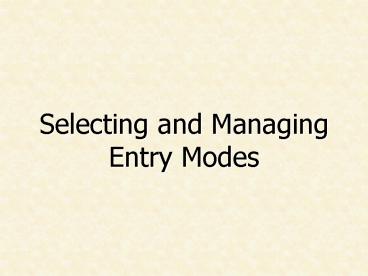Selecting and Managing Entry Modes - PowerPoint PPT Presentation
1 / 23
Title:
Selecting and Managing Entry Modes
Description:
... Avoiding Export Blunders Forms of Countertrade Export/Import Financing High-Risk Approaches Documentary Collection Slide 10 Letter of Credit Letter of ... – PowerPoint PPT presentation
Number of Views:178
Avg rating:3.0/5.0
Title: Selecting and Managing Entry Modes
1
Selecting and Managing Entry Modes
2
Chapter Preview
- Discuss the essential aspects of exporting
- Define each form of countertrade
- Explain each type of export/import financing
- Describe the advantages and disadvantages of each
contractual entry mode - Identify the pluses and minuses of each
investment entry mode - Identify strategic factors in selecting entry
modes
3
Developing an Export Strategy
Step 1
Step 2
Step 3
Step 4
Identify a potential market
Match needs to abilities
Initiate meetings
Commit resources
4
Degree of Export Involvement
Direct exporting (sell to buyers)
Indirect exporting (sell to intermediaries)
- Sales representatives
- Distributors
- Agents
- Export management companies
- Export trading companies
5
Avoiding Export Blunders
Conduct market research
Obtain export advice
Consider a freight forwarder
6
Forms of Countertrade
Barter Counterpurchase Offset agreement Switch
trading Buyback
Direct exchange without money Sale to a country
in return for promise of future purchase from
it Offset a hard-currency sale to a nation with
future hard-currency purchase Sale by a company
of an obligation to purchase from a
country Export of industrial equipment in return
for products the equipment produces
7
Export/Import Financing
8
High-Risk Approaches
Advance payment Importer pays exporter for
merchandise before it ships
Open account Exporter ships merchandise
and later bills importer
9
Documentary Collection
Bank acts as intermediary without accepting
financial risk
Draft (bill of exchange)
Bill of lading
Document that orders an importer to pay an
exporter a specified sum of money at a specified
time
Contract between an exporter and
shipper specifying destination and shipping
costs for merchandise
10
Documentary Collection Process
11
Letter of Credit
- Importers bank issues a document stating that
the bank will pay the exporter when exporter
fulfills documents terms
- Irrevocable
- Revocable
- Confirmed
12
Letter of Credit Process
13
Licensing
Company owning intangible property (licensor)
grants another firm (licensee) the right to use
it for a specified time
14
Franchising
Company (franchiser) supplies another
(franchisee) with intangible property over an
extended period
15
Management Contract
Company supplies another with managerial
expertise for a specific period of time
- Advantages
- Few assets risked
- Nations finance projects
- Develops local workforce
- Disadvantages
- Personnel at risk
- Create competitor
16
Turnkey Project
Company designs, constructs and tests a
production facility for a client
17
Wholly Owned Subsidiary
Facility entirely owned and controlled by a
single parent company
- Advantages
- Day-to-day control
- Coordinate subsidiaries
- Disadvantages
- Expensive
- High risk
18
Joint Venture
- Separate company created and jointly owned by two
or more independent entities to achieve a common
business objective - Forward Backward Buyback Multistage
- Advantages
- Reduce risk level
- Penetrate markets
- Access channels
- Protect interests
- Disadvantages
- Partner conflict
- Lose control
19
Strategic Alliance
Entities cooperate (but do not form a separate
company) to achieve strategic goals of each
Advantages Share project cost Tap
competitors strengths Gain channel access
Protect interests
Disadvantages Create competitor Partner
conflict
20
Entry Modes Strategic Factors
Cultural environment
Political/Legal environments
Market size
Production and shipping costs
International experience
21
Risk, Control, Experience
22
Chapter Review
- Discuss the essential aspects of exporting
- Define each form of countertrade
- Explain each type of export/import financing
- Describe the advantages and disadvantages of each
contractual entry mode - Identify the pluses and minuses of each
investment entry mode - Identify strategic factors in selecting entry
modes
23
Selecting and Managing Entry Modes































